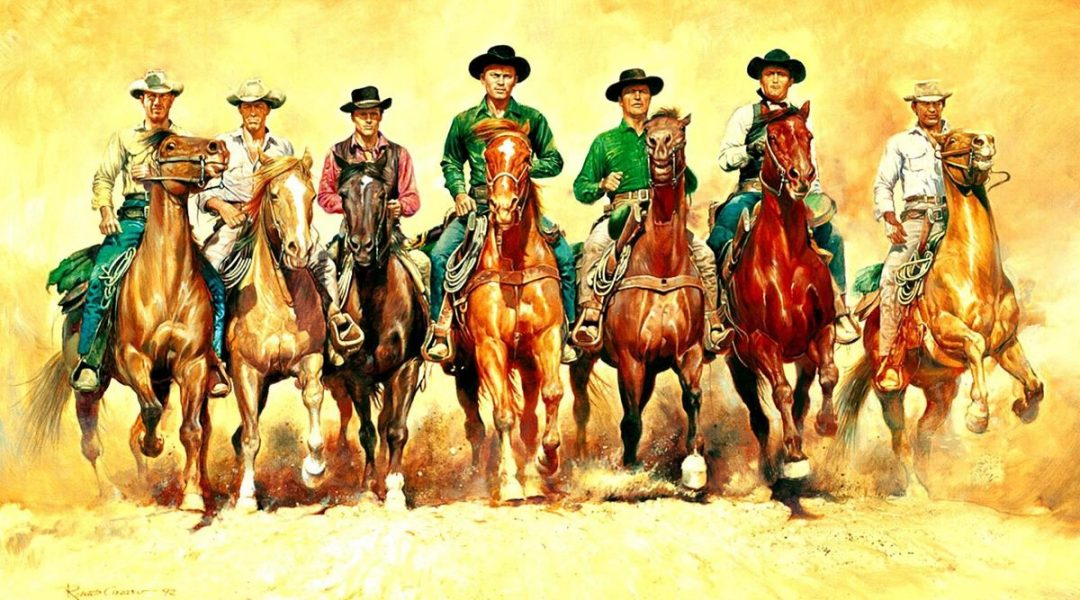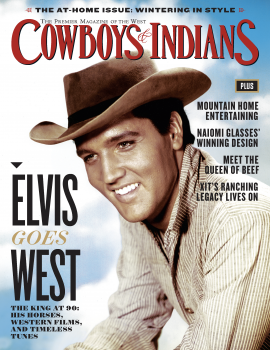Director John Sturges encountered more than his share of obstacles while assembling his ideal team for the 1960 western.
If you’re searching for the link between the darkly intense adult westerns of the 1950s and the down-and-dirty spaghetti westerns of the 1960s, look no further than The Magnificent Seven, John Sturges’ immensely popular and enduringly influential 1960 action-adventure film about hired guns who get a shot at redemption while employed to protect Mexican villagers against rapacious bandits.
Sturges and his screenwriters took their inspiration from an acclaimed Japanese action-adventure, Akira Kurosawa’s Seven Samurai — which itself was influenced by the classic American westerns of John Ford. Working with Kurosawa’s 1954 master-work as source material and a posse of rising young stars in lead roles, Sturges established the template for countless sequels, imitations, homages, and TV spinoffs.
And there’s a new remake coming to a theater near you: director Antoine Fuqua’s The Magnificent Seven, starring Denzel Washington, Ethan Hawke, and Chris Pratt.
Even so, the 1960 original remains in a class by itself. Indeed, it’s the sort of western you should show people who think they don’t like westerns. On one hand, it’s a rousingly old-fashioned tale of tarnished heroes who remain courageous under fire. At the same time, however, it’s also a thoughtfully revisionist meditation on the ways of men who live by their guns.
Yul Brynner stars in his signature role as Chris Adams, the man in black who is first among equals when it comes to shooting first, and last, and seldom asking questions later. (More than a decade after The Magnificent Seven, Brynner was cleverly cast as a robotic variation of this iconic character in the 1973 sci-fi thriller Westworld and, briefly, its 1976 sequel, Futureworld.)
Brynner’s character has few illusions about what sets him and men like him apart from lesser mortals. “It’s only a matter of knowing how to shoot a gun,” he tells a callow admirer. “Nothing big about that.” Even so, such expertise is in short supply among the desperate farmers whose remote village is repeatedly plundered by Calvera (Eli Wallach), a preening bandit leader who makes no apologies for exploiting the helpless. (“If God did not want them sheared,” he sneers, “he would not have made them sheep.”)
Under normal circumstances, Adams isn’t big on doing what amounts to pro bono work. But he finds himself moved by the plight of the farmers, who can offer hired guns only a meager compensation that represents “everything” they own. “I have been offered a lot for my work,” Chris says. “But never ‘everything.’ ”
And so, at a time when “men are cheaper than guns,” Adams finds it surprisingly easy to assemble a crack team of six straight shooters. His first recruit: Vin (Steve McQueen), a wisecracking gunfighter who proves he has the right stuff early on by helping Adams brush aside threats by racist rowdies as they arrange a proper burial for a deceased Indian in a small-town cemetery. After that, he enlists five other allies played by James Coburn, Robert Vaughn, Charles Bronson, Brad Dexter — and Horst Buchholz, a German actor improbably (but effectively) cast as Chico, an eager young Mexican who’s hell-bent on becoming a hero.
As Vaughn recalls in his 2008 autobiography, A Fortunate Life, the assembling of this impressive cast was very much a happy accident. Or, if you prefer, luck of the draw.
During pre-production for The Magnificent Seven, director Sturges — who already had the westerns Last Train From Gun Hill, Gunfight at the O.K. Corral, and The Law and Jake Wade to his credit — was constantly mindful of a potential impediment: The Screen Actors Guild had called a strike to start in spring 1960. In effect, Vaughn wrote, “an ax was hanging over every movie project in Hollywood” when he showed up at Sturges’ office for his audition.
“Unless the casting for a picture was completed by noon on a particular Friday, production couldn’t begin.”
That Friday was barely a month away, but Sturges had so far filled only two of the title roles — with McQueen, then best known for portraying a gritty bounty hunter on the TV series Wanted Dead or Alive, and Brynner, one of the first people to recognize that Kurosawa’s Seven Samurai could be successfully remade as a western.
Sturges had admired Vaughn’s Oscar-nominated performance as a maimed Korean War vet accused of murder in The Young Philadelphians (1959) and knew he wanted the rising young actor to appear in his next film. The only catch was, he didn’t really know what role he’d assign Vaughn to play. “We don’t have a script,” Sturges warned him, “just Kurosawa’s picture to work from. You’ll have to go on faith. But we’ll be filming in Cuernavaca. Never been there? You’ll love it — it’s the Palm Springs of Mexico.”
Vaughn replied that he was game. “Good decision, young man,” Sturges said. “And do you know any other good young actors? I’ve got four other slots to fill.”
As it turned out, Vaughn did indeed know at least one likely candidate: James Coburn, a friend and former classmate who had earned his spurs one year earlier in a supporting role opposite Randolph Scott in Budd Boetticher’s Ride Lonesome. In Guns for Hire: The Making of The Magnificent Seven, a documentary prepared for the western’s home-video release, Coburn recalls that he learned of the employment opportunity when he fortuitously ran into Vaughn at an L.A. supermarket.
After corralling three other actors to round out the seven, Sturges set his sights on New York stage actor Eli Wallach to play the bandit leader Calvera. At first, however, Wallach was concerned about the relative scarcity of his screen time. He accepted the part only after he realized how he could make every minute count.
“After rereading the script,” Wallach wrote in his autobiography, “I realized that even though I only appeared in the first few minutes of the film, the natives spoke about my return for the next 45 minutes : ‘Calvera’s coming.’ ‘When is he coming back?’ — so, I decided to do the part.”
Wallach’s only regret: He didn’t get the opportunity to hear Elmer Bernstein’s unforgettable musical score for The Magnificent Seven until long after on-location filming had wrapped in Cuernavaca.
“If I had heard that score,” Wallach wrote, “I think I would have ridden my horse differently. In the days of silent movies, mood music was played on the set to enrich the actors’ feeling for a scene. That would have helped me.
“During the shooting, Sturges always teased me about my horsemanship. ‘Why do you always type while galloping?’ he asked. ‘Type?’ I asked. ‘I don’t know what you mean.’ ‘Your right hand is holding the reins with authority,’ he said. ‘Your left bounces up and down as you gallop. It looks like you’re typing. Cut it out.’ ”
In the end, of course, neither Calvera nor the gunfighters who oppose him emerge as true victors. The meek — or, to be more precise, the Mexican farmers — are the ones who inherit the earth. But Chris, Vin, and their five cohorts wind up becoming legends, living or otherwise, by being true to their word and quick with their guns. And, yes, by being truly magnificent.
From the October 2016 issue.












